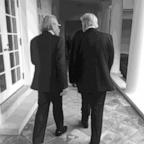Morgan Stanley repurchases TARP warrants
NEW YORK -- Morgan Stanley said Thursday it paid $950 million to buy back warrants from the government that could have eventually been converted to common shares in the bank.
New York-based Morgan Stanley issued the warrants to the Treasury Department as part of the loan package it received under the Troubled Asset Relief Program.
As part of the program, Morgan Stanley received $10 billion in funding from the government to help bolster its balance sheet as credit markets essentially shut down. In exchange, the government received preferred shares in Morgan Stanley and the warrants to purchase common shares.
The government launched the program at the height of the credit crisis, shortly after Morgan Stanley's competitor Lehman Brothers collapsed. Hundreds of banks participated in the $700 billion program.
In June, Morgan Stanley repaid the $10 billion loan, eliminating the outstanding preferred shares.
Between the repurchase of the warrants and dividends paid on the preferred shares, Morgan Stanley paid the government $1.27 billion.
Other large financial firms that repaid TARP funds in June have also begun to repurchase warrants, including Goldman Sachs and American Express.
Linus Wilson, an assistant professor of finance at the University of Louisiana at Lafayette said Morgan Stanley's deal to repurchase warrants was much better than either Goldman Sachs or American Express. That means taxpayers made out worse on the Morgan Stanley deal.
"They basically paid less," Wilson said, based on the amount of common shares tied to the warrants and the price the government could have received for those shares.
Goldman Sachs paid $1.1 billion to repurchase its warrants. Like Morgan Stanley, Goldman received $10 billion as part of the program.
American Express, which received $3.39 billion in TARP money, paid $340 million to repurchase its warrants.
Wilson estimated Morgan Stanley paid about 68 cents on the dollar for the warrants, while Goldman paid 98 cents on the dollar and American Express paid 107 cents on the dollar.



